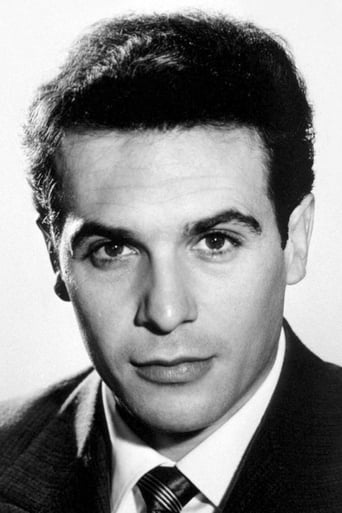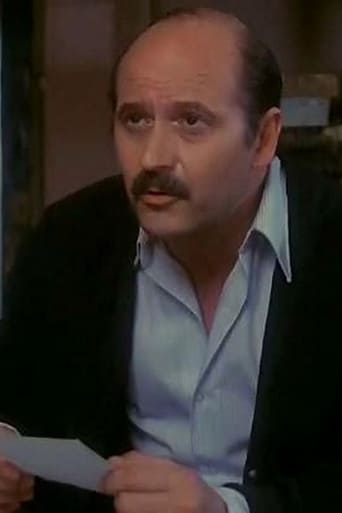Pacionsbo
Absolutely Fantastic
TaryBiggBall
It was OK. I don't see why everyone loves it so much. It wasn't very smart or deep or well-directed.
Hayden Kane
There is, somehow, an interesting story here, as well as some good acting. There are also some good scenes
Roxie
The thing I enjoyed most about the film is the fact that it doesn't shy away from being a super-sized-cliche;
randy filkirk
Having traveled extensively throughout Spain this film evokes memories and images from a long lost Spain and a time which although still exists, now is much diluted. Every aspect of this, at some points sleepy, film are for me very real. The acting is superb, and the filmed scenes carefully and accurately depicted. I have never read the book, but having seen this i will now scout for it. I had no idea the cork oaks were used for such purpose and the pomp and circumstance was also an eye opener/ i gave 7 out of 10,but 10 out of 10 for effort, from both the acting cast and the direction. These places do exists still today, and are still owned by the landed gentry, very much fenced off and off limits to the rest of us as you pass through such regions. I often wonder if they still employ people and treat them the same......
sukerman
In this film, you can see a important part of the recent history of my great country. This film is about the life in a big "cortijo" after civil war in 50-60´S, you can see the lives between rich people, like "señorito Ivan", and poor, like "Paco el Bajo", and how are the relations between this kind of people,they are near to the slavery. Besides, you can see poverty´s ravage, and the many different kind of familiar´s drama.
Keith F. Hatcher
The last twenty five years of Spanish filmography have produced a number of titles which have indulged in sociological themes, mostly using the years of the Franco Régime as a background when not a mere scapegoat. El Sur (Victor Erice)(qv), Las Ratas (Giménez Rico)(qv), Las Bicicletas son para el Verano (Jaime Chávarri) as well as several by the now deceased Pilar Miró, come to mind. But perhaps none reach the powerful endorsement achieved in Los Santos Inocentes, carefully and predictably directed by Mario Camus. Faithfully transferred from the book by Miguel Delibes, also author of Las Ratas, as well as singularly impressive narratives such as Cinco Horas con Mario, a true tour de force in contemporary literature, and the intensely lyrical and moving El Camino, Camus inspired the principal actors - Paco Rabal, Alfredo Landa and Terele Pávez - into producing some memorable scenes.Scenes of illiterate peasants obeying their master, landowner, insensible to everything except his passion for hunting; peasants who were so hugely grateful for the handful of pennies so compassionately handed out by the rich duchess; peasants who grovelled in the filth of their mean shack and could barely write their own names. Spain: about 1962 if the registration number of the big black Mercedes is anything to go by. Spain, in the region called Extremadura, which even today is the poorest part of the country. Spain, governed by a dictator who himself was extremely uncultured. Camus, armed with the simple but sincere exposition in Delibes' novel, manages to show this plight, but without the tremendism so frequent in Spanish books or films; without any soured feelings, but dispassionately, like a surgeon operating for the five hundredth time on gall-stones. The story was there to be told and not sympathized over. Not for the pop-corn eating public, more for the discerning cinema-goer who can give what the film demands: attention to details. The incision is precise, exact, giving greater credibility to this little masterpiece.
Miguel Angel Diaz Gonzalez
This is one of the best Spanish movies I have seen. For many reasons. First, the story, which is based on a great novel by the brilliant writer Miguel Delibes, can be seen from different points of view: as the characters in themselves, or as the history of the spanish society through two generations. Second, the actors do an incredible performance (Paco Rabal and Alfredo Landa are really fantastic, not to mention Juan Diego, Mary Carrillo, Terele Pávez...). Third, the scenes' directing and editing rise to the occasion. The result is a fresh, intelligent and charming film that we won't forget for a long time. Perhaps Belén Ballesteros and Juan Sachez's performances aren't worthy of the occasion, but that's the least of my worries.






